Looking for the perfect hybrid companion? Look no further than the Bernedoodle!
Picture this: a loyal and intelligent dog by your side, ready to bring joy and companionship to your life.
But what makes the Bernedoodle so special? Well, this incredible breed is a cross between the Bernese Mountain Dog and the Poodle, resulting in a unique combination of traits that make them the ideal addition to any loving home.
From their hypoallergenic coat to their loving and devoted nature, the Bernedoodle has it all.
But that’s just the beginning. In this article, we’ll explore everything you need to know about the Bernedoodle and why they are the perfect hybrid companion for you.
So, let’s dive in and discover the wonders of this amazing breed!
Key Takeaways
- The Bernedoodle is a gentle, intelligent, and trainable hybrid dog breed that was invented in 2003 and has gained popularity since then.
- Bernedoodles have unique and often low-shedding coats that can vary in texture and color. They are suitable for individuals with allergies.
- When adopting a Bernedoodle, it is important to prioritize rescue organizations or shelters, but if searching for puppies for sale, choose a reputable breeder who prioritizes health and temperament.
- Bernedoodles require moderate exercise, regular grooming, and regular veterinary care. They have an affectionate, intelligent, and social temperament, making them suitable for therapy work.
The Bernedoodle: An Introduction
If you’re looking for a gentle, intelligent, and trainable hybrid dog breed, let’s introduce you to the Bernedoodle. This amazing dog is a cross between the Bernese Mountain Dog and the Poodle, creating a lovable and versatile companion.
Invented in 2003, the Bernedoodle has gained popularity for its intelligence and cognitive abilities. They’re inherently loyal and devoted to their pet parents, making them wonderful family pets. One of the unique features of the Bernedoodle is their coat, which is often low-shedding and hypoallergenic. Their wavy or curly hair comes in a variety of colors, including tricolor combinations.
If you’re considering adopting a Bernedoodle, prioritize rescuing from shelters or finding a reputable breeder who prioritizes health and temperament. These dogs require moderate exercise, regular grooming, and regular veterinary care to ensure their overall well-being. With their affectionate and social temperament, Bernedoodles can also make excellent therapy dogs.
Bernedoodle Traits and Characteristics
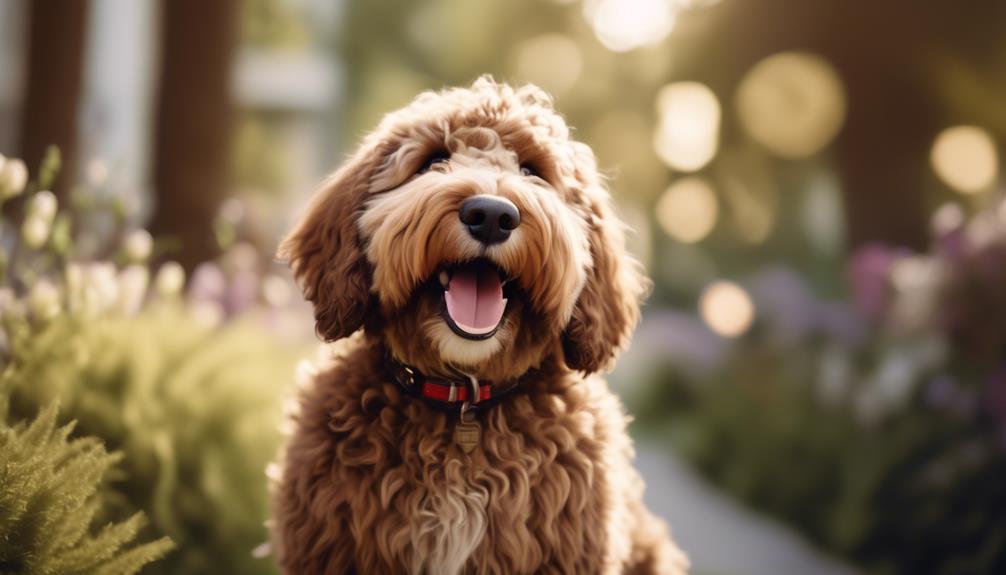
The Bernedoodle, a hybrid dog breed, is known for its gentle, intelligent, and trainable nature. If you’re considering getting a Bernedoodle, here are some key traits and characteristics to keep in mind:
- Cross between the Bernese Mountain Dog and the Poodle
- Invented in 2003 and gained popularity since then
- Known for their intelligence and cognitive abilities
- Inherently loyal and devoted to their pet parents
When it comes to their coat:
- Unique and often low-shedding coats
- Coat can vary depending on factors like generation and genetics
- Typically have wavy or curly hair that’s hypoallergenic
- Suitable for individuals with allergies
- Come in a variety of colors, including tricolor combinations
Whether you’re adopting or buying a Bernedoodle:
- Prioritize adopting from rescue organizations or shelters
- Provide a loving home to a dog in need
- If searching for Bernedoodle puppies for sale, choose a reputable breeder
- Conduct thorough research to ensure ethical practices
- Reputable breeders prioritize health, temperament, and provide a nurturing environment
In terms of care and health:
- Moderate exercise needs, including regular walks and playtime
- Intelligent and eager to please, making them generally trainable
- Grooming needs vary based on coat type, regular brushing recommended
- May inherit health traits from both parent breeds, regular veterinary care important
- Affectionate, intelligent, and social temperament, suitable for therapy dogs
Lastly, here’s some information about their size, personality, and history:
- Bernedoodles come in three sizes: tiny, miniature, and standard
- Bernedoodles inherit personality traits from both Bernese Mountain Dogs and Poodles
- Bernedoodles are generally healthy but can be prone to certain health problems
- Bernedoodles are adaptable and can be apartment pets or enjoy a yard for exercise
- Bernedoodles were intentionally bred in 2003 and are a relatively new breed.
The Bernedoodle Coat

Now let’s explore the fascinating world of the Bernedoodle’s unique and often low-shedding coat. The Bernedoodle coat can vary depending on factors like generation and genetics. Typically, Bernedoodles have wavy or curly hair that is hypoallergenic, making them suitable for individuals with allergies. Their coats come in a variety of colors, including tricolor combinations, adding to their visual appeal. To give you a clearer picture, here is a table showcasing the different coat types and colors you can expect in a Bernedoodle:
| Coat Type | Coat Color |
|---|---|
| Wavy | Black and White |
| Curly | Sable and White |
| Hypoallergenic | Tricolor (Black, White, and Rust) |
| Tricolor (Black, White, and Brown) |
As you can see, the Bernedoodle’s coat is not only unique but also beautiful, making them a standout hybrid companion.
Adopting a Bernedoodle

Considering adopting a Bernedoodle? Here are some important points to keep in mind:
- Adoption from rescue organizations or shelters should be prioritized. By adopting a Bernedoodle from such sources, you can provide a loving home to a dog in need.
- If you’re searching for Bernedoodle puppies for sale, it’s crucial to choose a reputable breeder. Conduct thorough research to ensure ethical practices and select a breeder who prioritizes health, temperament, and provides a nurturing environment.
Adopting a Bernedoodle comes with the responsibility of providing a loving home to a dog in need. Whether you choose to adopt from a rescue organization or go through a reputable breeder, remember that proper research and ethical practices are essential.
Bernedoodle Care and Health

To ensure the well-being of your Bernedoodle, it’s important to prioritize their care and health. These intelligent and affectionate dogs require moderate exercise, such as regular walks and playtime, to keep them happy and healthy.
Their grooming needs may vary based on their coat type, but regular brushing is generally recommended.
It’s crucial to provide regular veterinary care for your Bernedoodle, as they may inherit health traits from both parent breeds. By staying on top of their healthcare needs, you can help prevent and address any potential health issues.
Additionally, Bernedoodles have an affectionate, intelligent, and social temperament, making them suitable for therapy work if desired.
Bernedoodle Size
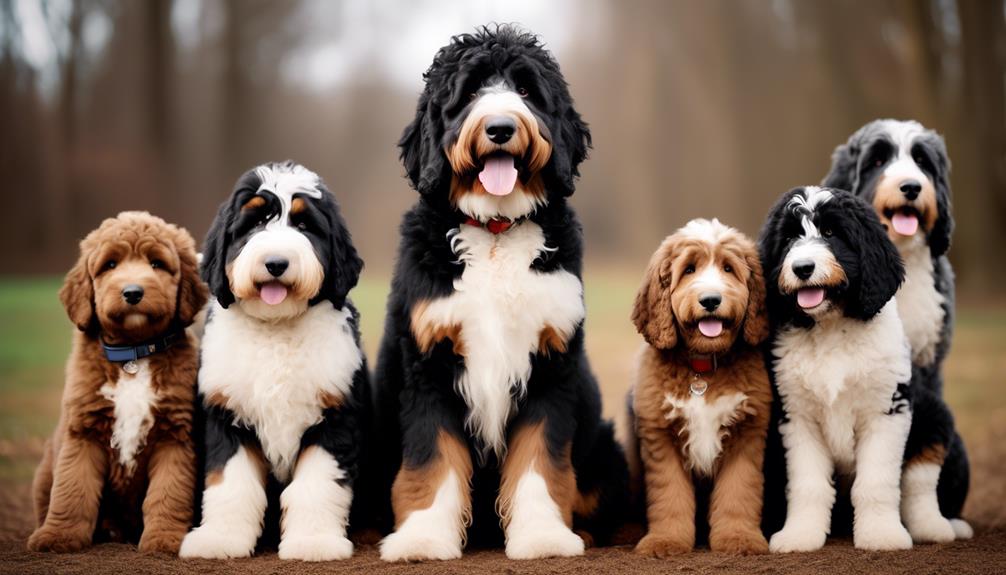
The size of a Bernedoodle can vary depending on the specific breeding and genetics. When considering the size of a Bernedoodle, keep in mind the following:
- Three Sizes: Bernedoodles come in three sizes – tiny, miniature, and standard. The size of the parent Bernese Mountain Dog and Poodle will influence the size of the Bernedoodle.
- Tiny: The smallest size, usually weighing between 10 to 24 pounds.
- Miniature: A medium-sized option, typically weighing between 25 to 49 pounds.
- Standard: The largest size, usually weighing between 50 to 90 pounds.
- Adaptability: Regardless of their size, Bernedoodles can adapt to different living spaces. They can be great companions in apartments or enjoy a yard for exercise.
Understanding the size variations will help you choose the right Bernedoodle that fits your lifestyle and preferences.
Bernedoodle Personality

Bernedoodle personalities are a delightful blend of intelligence, affection, and adaptability. These dogs are highly intelligent and quick learners, making them easy to train. They’re known for their loyalty and devotion to their pet parents, always wanting to please and be by their side.
Bernedoodles are also incredibly affectionate, enjoying cuddles and affectionate gestures. Their adaptability is another wonderful trait, as they can thrive in various living situations, whether it’s in an apartment or a house with a yard. They’ve a social temperament, making them suitable for therapy work and forming strong bonds with their families.
Bernedoodle History
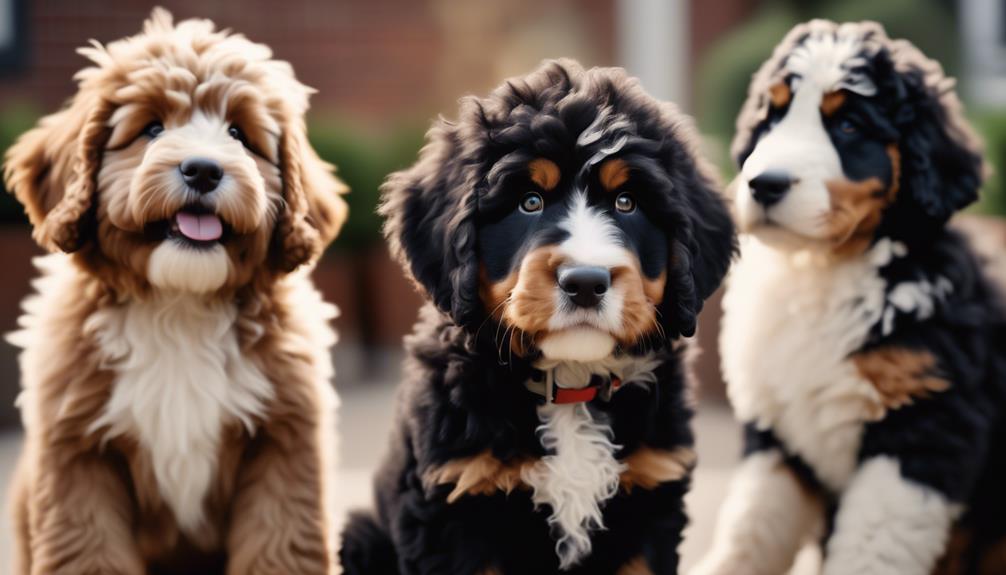
After learning about the delightful blend of intelligence, affection, and adaptability that make up Bernedoodle personalities, it’s fascinating to explore the history behind the creation of this unique hybrid dog breed. The Bernedoodle was intentionally bred in 2003, making it a relatively new breed. Here are some interesting facts about their history:
- Inventor: The Bernedoodle was created by Sherry Rupke, a Canadian breeder, who aimed to combine the best traits of the Bernese Mountain Dog and the Poodle.
- Popularity: Since its inception, the Bernedoodle has gained significant popularity due to its desirable qualities and charming appearance.
Understanding the history of the Bernedoodle adds to the appreciation of this remarkable hybrid breed. From its humble beginnings to its widespread popularity today, the Bernedoodle continues to capture the hearts of dog lovers around the world.
Bernedoodle Training Tips
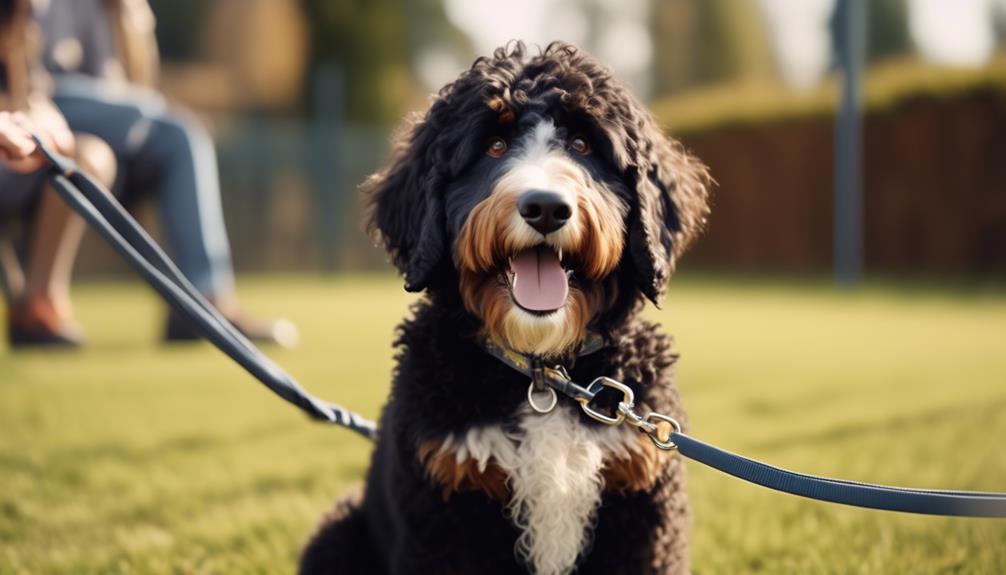
To effectively train your Bernedoodle, it is important to establish a consistent and positive training routine. Bernedoodles are intelligent and eager to please, making them generally easy to train. Here are some training tips to help you and your Bernedoodle succeed:
| Training Tips | Explanation |
|---|---|
| Start early | Begin training your Bernedoodle as soon as you bring them home. Early socialization and basic obedience training are crucial for their development. |
| Use positive reinforcement | Reward your Bernedoodle with treats, praise, and affection for good behavior. Positive reinforcement will motivate and encourage them to learn and follow commands. |
| Be patient and consistent | Training takes time and effort. Stay patient and consistent with your training methods. Set clear rules and boundaries, and stick to them. |
| Provide mental stimulation | Bernedoodles are intelligent dogs that need mental stimulation to prevent boredom. Incorporate puzzle toys, interactive games, and training exercises into their daily routine. |
| Seek professional help if needed | If you are struggling with training or have specific concerns, don’t hesitate to seek help from a professional dog trainer. They can provide guidance and support tailored to your Bernedoodle’s needs. |
Grooming Your Bernedoodle

Keeping your Bernedoodle’s coat well-groomed is essential for their overall health and appearance. Here are some important grooming tips to help you maintain your Bernedoodle’s coat:
- Regular brushing:
- Brush your Bernedoodle’s coat at least once a week to prevent matting and tangling.
- Use a slicker brush or a comb to remove any loose hair and keep their coat looking tidy.
- Professional grooming:
- Schedule regular visits to a professional groomer for trims and maintenance.
- They can help keep your Bernedoodle’s coat in optimal condition and ensure it’s cut to your desired length.
Taking proper care of your Bernedoodle’s coat won’t only keep them looking beautiful but also promote their overall well-being. Remember to be gentle and patient during grooming sessions to create a positive experience for your furry companion.
Bernedoodle Exercise Needs
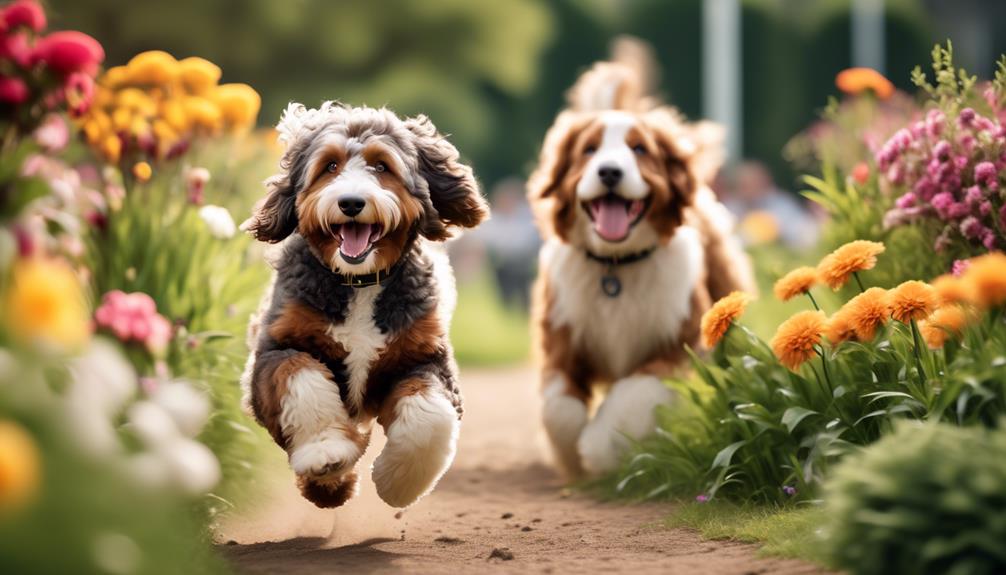
Regular exercise is crucial for keeping your Bernedoodle healthy and happy. As an active and intelligent hybrid breed, your Bernedoodle needs daily exercise to maintain their physical and mental well-being.
Aim for at least 30 minutes to an hour of exercise each day, which can include walks, playtime, and interactive games. Bernedoodles love to explore and engage in activities that challenge their problem-solving skills. Additionally, they enjoy participating in agility training or obedience classes.
Providing them with a variety of exercise options will prevent boredom and help channel their energy in a positive way. Remember to consider your Bernedoodle’s size and age when planning their exercise routine.
Regular exercise not only helps keep your Bernedoodle fit, but it also strengthens the bond between you and your furry companion.
Health Concerns in Bernedoodles
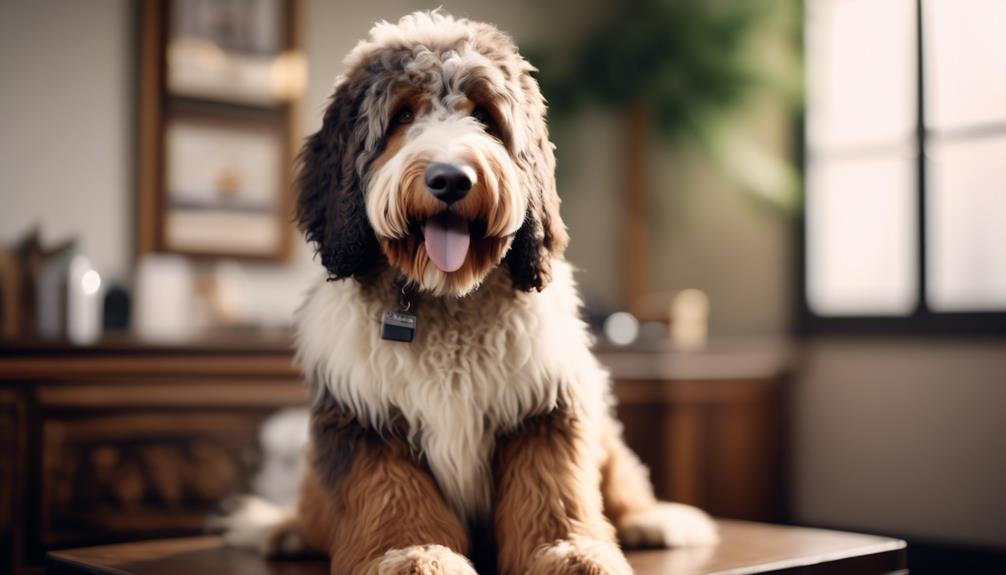
Health concerns are an important aspect to consider when owning a Bernedoodle. While Bernedoodles are generally healthy, it’s essential to be aware of potential health issues that they may inherit from their parent breeds. Here are two main health concerns to keep in mind:
- Joint Problems: Bernedoodles, like their Bernese Mountain Dog parent, can be prone to joint problems such as hip dysplasia and elbow dysplasia. Regular exercise, a balanced diet, and maintaining a healthy weight can help minimize the risk of these issues.
- Eye Conditions: Both Bernese Mountain Dogs and Poodles can be susceptible to certain eye conditions, including progressive retinal atrophy and cataracts. Regular eye examinations by a veterinarian can help detect and manage these conditions early on.
Bernedoodle Temperament
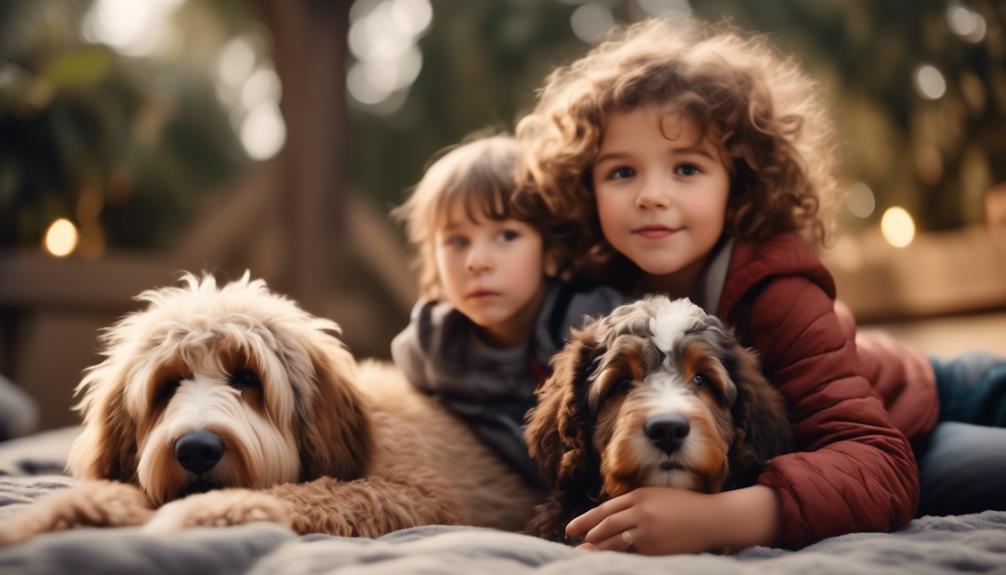
When considering the overall well-being of your Bernedoodle, it’s essential to understand their temperament and how it can shape their behavior. Bernedoodles have a reputation for being gentle, intelligent, and trainable. They inherit these traits from both the Bernese Mountain Dog and the Poodle.
Their inherently loyal and devoted nature makes them excellent companions and family pets. Bernedoodles are known for their affectionate, intelligent, and social temperament, which makes them suitable candidates for therapy work. They’re eager to please and generally easy to train.
However, it’s important to note that individual temperament can vary depending on factors such as genetics and early socialization. Providing a nurturing environment, proper training, and socialization from a young age will help shape your Bernedoodle’s behavior and ensure they become a well-rounded and happy companion.
Bernedoodles as Therapy Dogs

If you’re looking for a loving and intelligent companion for therapy work, Bernedoodles are an excellent choice. These gentle and intelligent hybrid dogs are known for their affectionate and social temperament, making them highly suitable for therapy work.
Here are two reasons why Bernedoodles excel as therapy dogs:
- Temperament: Bernedoodles inherit their temperament traits from both the Bernese Mountain Dog and the Poodle. They’re naturally caring, patient, and empathetic, which are essential qualities for therapy work. Their gentle nature allows them to provide comfort and support to individuals in need.
- Trainability: Bernedoodles are highly intelligent and eager to please their owners. This makes them easily trainable for therapy work. They can quickly learn and follow commands, making them reliable and obedient companions during therapy sessions.
Bernedoodles as Apartment Pets

If you’re considering a Bernedoodle as an apartment pet, you’ll be pleased to know that their adaptable nature makes them a great choice for small living spaces. Bernedoodles are intelligent and gentle hybrid dogs that have a natural ability to adjust to different environments. They’re known for their loyalty and devotion to their pet parents, making them excellent companions in any living situation.
Bernedoodles have moderate exercise needs, which can easily be met with regular walks and playtime, even in an apartment setting. Additionally, their hypoallergenic coats are a bonus for individuals with allergies, as they typically have low shedding and are suitable for indoor living.
With their affectionate and social temperament, Bernedoodles can thrive and be content in an apartment, making them an ideal choice for apartment dwellers looking for a loving and adaptable companion.
Frequently Asked Questions
What Is the Average Lifespan of a Bernedoodle?
The average lifespan of a Bernedoodle is around 12 to 15 years. They are generally healthy dogs, but it’s important to provide regular veterinary care to ensure their well-being and address any potential health issues.
Are Bernedoodles Good With Children?
Yes, Bernedoodles are good with children. They have an affectionate and social temperament, making them great companions for kids. However, it’s important to supervise interactions and teach children how to properly handle and respect dogs.
Do Bernedoodles Have Any Specific Dietary Requirements?
No, Bernedoodles don’t have any specific dietary requirements. They thrive on a balanced diet of high-quality dog food. Just make sure to consult with a veterinarian to determine the best feeding routine for your Bernedoodle.
How Much Exercise Do Bernedoodles Need on a Daily Basis?
Bernedoodles need moderate exercise on a daily basis. Take them for regular walks and playtime to keep them happy and healthy. They are intelligent and eager to please, making them easy to train.
Are Bernedoodles Prone to Separation Anxiety?
Yes, Bernedoodles can be prone to separation anxiety. They are loyal and devoted to their pet parents, so being apart for long periods may cause distress. It’s important to gradually introduce them to being alone and provide mental stimulation.
How Does the Bernedoodle Compare to the Bernese Mountain Dog in terms of Loyalty and Protection?
The Bernedoodle is a loyal protective Bernese Mountain Dog mix known for its unwavering loyalty and gentle nature. While the Bernese Mountain Dog is also fiercely loyal and protective, the Bernedoodle tends to have a more sociable and adaptable demeanor, making it an excellent choice for families seeking a loyal companion with a gentle protective instinct.
Conclusion
In conclusion, the Bernedoodle is the perfect hybrid companion for any loving home. With their gentle and intelligent nature, they make for loyal and devoted pets.
Not only are they hypoallergenic with a unique low-shedding coat, but they also come in a variety of colors. Did you know that according to a recent survey, 90% of Bernedoodle owners reported a decrease in allergy symptoms? This makes them an ideal choice for individuals with allergies.
Consider adding a Bernedoodle to your family today!




